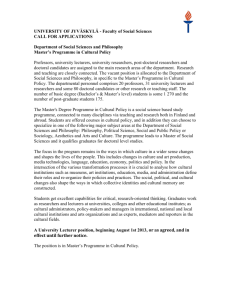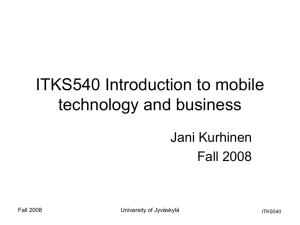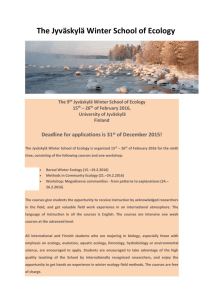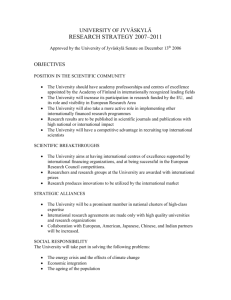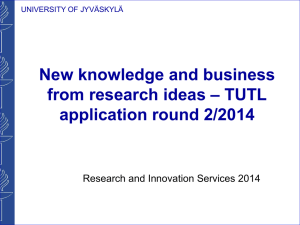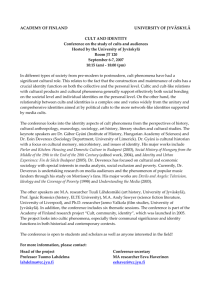1.2. Quality and innovative aspects of the
advertisement
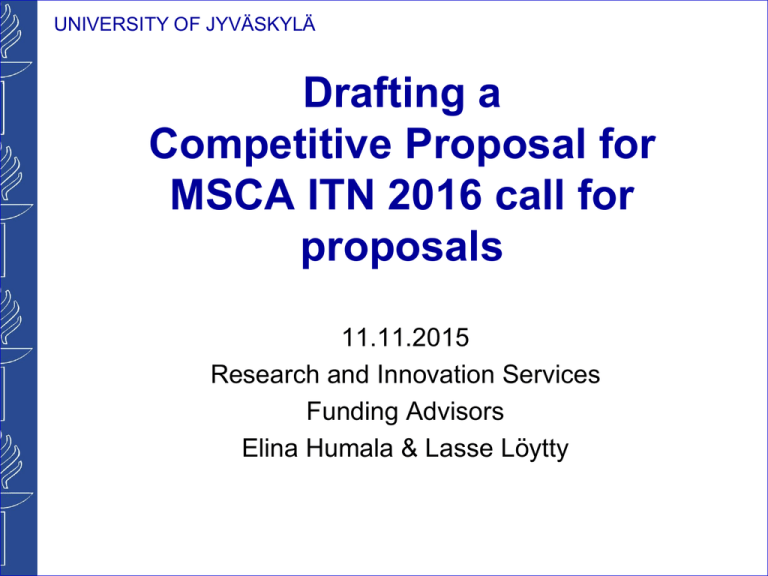
UNIVERSITY OF JYVÄSKYLÄ Drafting a Competitive Proposal for MSCA ITN 2016 call for proposals 11.11.2015 Research and Innovation Services Funding Advisors Elina Humala & Lasse Löytty UNIVERSITY OF JYVÄSKYLÄ Extra for the day before we start: Responsible research & innovation UNIVERSITY OF JYVÄSKYLÄ Content Introduction Award criteria for applications PART B (Scientific proposal) 1. EXCELLENCE 2. IMPACT 3. IMPLEMENTATION___________________30 pages________ 4. GANTT CHART 5. CAPACITIES OF THE PARTICIPATING ORGANISATIONS 6. ETHICAL ISSUES 7. LETTERS OF COMMITMENT PART A (Administrative forms) and electronic submission service UNIVERSITY OF JYVÄSKYLÄ The specific objectives of the Marie Skłodowska-Curie Innovative Training Networks to train a new generation of creative, entrepreneurial and innovative early-stage researchers able to face current and future challenges and to convert knowledge and ideas into products and services for economic and social benefit; to raise excellence and structure research and doctoral training, extending the traditional academic research training setting, incorporating the elements of Open Science and equipping researchers with the right combination of researchrelated and transferable competences. to provide enhanced career perspectives in both the academic and non-academic sectors through international, interdisciplinary and intersectoral mobility combined with an innovation-oriented mind-set. UNIVERSITY OF JYVÄSKYLÄ Award Criteria UNIVERSITY OF JYVÄSKYLÄ Award Criteria Each criterion will be scored out of 5. Decimal points will be given: 0 – Proposal fails to address the criterion or cannot be assessed due to missing or incomplete information. 1 – Poor. The criterion is inadequately addressed, or there are serious inherent weaknesses. 2 – Fair. Proposal broadly addresses the criterion, but there are significant weaknesses. 3 – Good. Proposal addresses the criterion well, but a number of shortcomings are present. 4 – Very Good. Proposal addresses the criterion very well, but a small number of shortcomings are present. 5 – Excellent. Proposal successfully addresses all relevant aspects of the criterion. Any shortcomings are minor. UNIVERSITY OF JYVÄSKYLÄ Learned from 2014 and 2015 evaluations Big picture is challenging to describe, connecting all of the parts of the puzzle is challenging Adding sufficient amount of details taking into consideration the page limit Role of non-academic sector too weak Risk management is weak It is extremely important to address all the questions and points! (you need to get well over 90 points of 100) Perfection is possible! JY has already three projects! UNIVERSITY OF JYVÄSKYLÄ How to write successful application Important scientific topic Equal contributions of non-academic partners/beneficiaries Experienced consortium Convincing need for training in topic of the project Coherent proposal UNIVERSITY OF JYVÄSKYLÄ Discussion 1 Discuss what are the current and future trends in Doctoral training for few minutes UNIVERSITY OF JYVÄSKYLÄ Application consists Part B 1 and 2 = Research and training programmes along with the practical arrangements planned to implement them Part A = Administrative forms – Section 1: General information about the proposal; – Section 2: Data on participating organisations; – Section 3: Budget (request for funding in terms of person-months); – Section 4: Ethics table; – Section 5: Information on partner organisations. UNIVERSITY OF JYVÄSKYLÄ B1 and 2 –General information For the 2016 call, applicants must submit Part B of their proposal as two separate documents: Document 1 must comprise: – the Start Page (1 page), List of Participants data (2 pages) , and then – Part B sections 1-3. – section 1 must start on page 4 of the document. – Of the maximum 30 pages applied to sections 1, 2 and 3, applicants are free to decide on the allocation of pages between the sections. Document 2 must consist of: – Part B sections 4-7. – no overall page limit will be but in section 5, a maximum of one page should be used per beneficiary and half a page per partner organisation). The minimum font size allowed for the main text is 11 points Literature references should be listed in footnotes, font size 8. UNIVERSITY OF JYVÄSKYLÄ B1 and 2 –General information UNIVERSITY OF JYVÄSKYLÄ B1- List of Participants Companies needed as beneficiaries! 5-7 organisation could be ideal UNIVERSITY OF JYVÄSKYLÄ B1- Excellence 1.1 Quality, innovative aspects and credibility of the research programme (including inter/multidisciplinary, intersectoral and, where appropriate, gender aspects) Required sub-headings: Introduction, objectives and overview of the research programme. For ETN projects, it should be explained how the individual projects of the recruited researchers will be integrated into – and contribute to – the overall research programme. EJD and EID projects should describe the research projects in the context of a doctoral training programme Research methodology and approach Originality and innovative aspects of the research programme (in light of the current state of the art and existing programmes / networks / doctoral research trainings) UNIVERSITY OF JYVÄSKYLÄ 1.1. Quality, innovative aspects and credibility of the research Introduction: – Does the proposal address a well formulated problem? – Why is it important? – Does it fill a gap of future and current needs? What is the need for a new generation of scientist? Why do we need to train them now? – Why we need European consortium? – What key qualifications would make PhD attractive for employees in academia, industry and elsewhere? UNIVERSITY OF JYVÄSKYLÄ 1.1. Quality, innovative aspects and credibility of the research Objectives: – One overarching aim/goal and limited number of objectives (3-5) • Address the need and important research questions • Progress significantly beyond the current state of art • Address both research and training • Be multidisciplinary/transdisciplinary or interdisciplinary • Be linked to WPs • Be achievable and feasible within the lifespan of the project Objective should be S.M.A.R.T.: – Specific – target a specific area for improvement. – Measurable – quantify or at least suggest an indicator of progress. – Assignable – specify who will do it. – Realistic – state what results can realistically be achieved, given available resources. – Time-related – specify when the result(s) can be achieved. UNIVERSITY OF JYVÄSKYLÄ 1.1. Quality, innovative aspects and credibility of the research Overview of the research programme Consider what is common for: – Individual projects 15 – Common themes Source: RRI Tools: http://www.rri-tools.eu/workplan-deliverables UNIVERSITY OF JYVÄSKYLÄ 1.1. Quality, innovative aspects and credibility of the research Research methodology and approach UNIVERSITY OF JYVÄSKYLÄ Example of basic structure for your research project NEED Project idea & concept Objective 1 Objective 2 Objective 3 Objective 4 Work Package 1 WP2 WP3 WP4 Deliverable 1.1 Deliverable 1.2 Deliverable 2.1 Deliverable 3.1 ….. Deliverable 8.1 MILESTONE1 MILESTONE 2 Expected result 1 Expected result 2 Expected result 3 ….. Indicator 1 Indicator 2 Indicator 3 ….. UNIVERSITY OF JYVÄSKYLÄ 1.1. Quality, innovative aspects and credibility of the research Originality and innovative aspects of the research programme (in light of the current state of the art and existing programmes / networks / doctoral research trainings) – Why are you better than everyone else? Check existing projects and consider why are you better. – What new, novel, unconventional are you doing (equipment, methods, technologies, data, resources, integration)? UNIVERSITY OF JYVÄSKYLÄ 1.2. Quality and innovative aspects of the training programme Required subheadings – Overview and content structure of the training (ETN) or doctoral programme (EID/EJD), including network-wide training events and complementarity with those programmes offered locally at the participating institutions (please include table 1.2a and table 1.2b) – Role of non-academic sector in the training programme UNIVERSITY OF JYVÄSKYLÄ 1.2. Quality and innovative aspects of the training programme Overview and content structure of the training – Description of the training programme following ECTS system to describe the planned training including network-wide and local training – Role of participants, role of partners organisations, role of external contributors, role of non-academic sector – Supervision arrangements UNIVERSITY OF JYVÄSKYLÄ 1.2. Quality and innovative aspects of the training programme Overview and content structure of the training – Where are the gaps for doctoral training? Training activities might include: – Training through research by means of individual, personalised projects, including meaningful exposure to different sectors; – Development of network-wide training activities (e.g. workshops, summer schools) that exploit the inter/multi-disciplinary and intersectoral aspects of the project and expose the researchers to different schools of thought. Such events could also be open to external researchers; – Provision of structured training courses (e.g. tutorials, lectures) that are available either locally or at another participant. Training programmes between the participants are expected to be coordinated to maximise added value (e.g. joint syllabus development, opening up of local training to other network teams, joint PhD programmes, etc.); – Exchanging knowledge with the members of the network through undertaking intersectoral visits and secondments. A strong networking component is expected in each proposal; – Invitation of visiting researchers originating from the academic or nonacademic sector. This would be aimed at improving the skills and know-how of the researchers and should be duly justified in the context of the training programme. UNIVERSITY OF JYVÄSKYLÄ 1.2. Quality and innovative aspects of the training programme Overview and content structure of the training – DO NOT FORGET SOFTER SKILLS, consider transferable skills training both within and outside the network. Topics of interest could include: • Training related to research and innovation: management of IPR, take up and exploitation of research results, communication, standardisation, ethics, scientific writing, personal development, team skills, multicultural awareness, gender issues, research integrity, etc. • Training related to management or grant searching: involvement in the organisation of network activities, entrepreneurship, management, proposal writing, enterprise start-up, task co-ordination, etc. UNIVERSITY OF JYVÄSKYLÄ 1.2. Quality and innovative aspects of the training programme UNIVERSITY OF JYVÄSKYLÄ 1.3 Quality of the supervision Required sub-headings: – Qualifications and supervision experience of supervisors • Consider what qualifications could be collected from all supervisors (time they can use for supervision, H-index, how many PhD students they have supervised, positions, international collaboration, total number of publications, numbers of papers with high impact factor, project portfolio, etc.) – Quality of the joint supervision arrangements (mandatory for EID and EJD). • How often? Who? Who is present? Is there a role for mentor? Who proves Personal Career Development Plans? UNIVERSITY OF JYVÄSKYLÄ 1.4 Quality of the proposed interaction between the participating organisations Required sub-headings: Contribution of all participants to the research and training programme – Consider perhaps different roles each has (supervision, secondments, contribution to training events, mentoring, etc.) Synergies between participants – Consider perhaps joint actions, complementarities in competences, added value of collaboration, etc. Exposure of recruited researchers to different (research) environments, and the complementarity there of – What kind of secondments to non-academic organisations and to other research organisations UNIVERSITY OF JYVÄSKYLÄ B2 Impact Expected Impact from the call: At researcher level: Increased set of skills, both research-related and transferable ones, leading to improved employability and career prospects both in and outside academia Increase, in the longer-term, in higher impact R&I output, more knowledge and ideas converted into products and services Greater contribution, in the longer term, to the knowledge-based economy and society At organisation level: Enhanced cooperation and better transfer of knowledge between sectors and disciplines Improvement in the quality of training programmes Creation of new networks and enhanced quality of existing ones Boosting R&I capacity among participating organisations Increased internationalisation of participating organisations At system level: Increase in international, interdisciplinary and intersectoral mobility of researchers in Europe More structured and innovative doctoral training, enhanced implementation of the European Charter and Code and the EU Principles for Innovative Doctoral Training Stronger links between the European Research Area (ERA) and the European Higher Education Area (EHEA), notably through supporting the knowledge triangle between research, innovation and education Improvement in the working and employment conditions for doctoral candidates in Europe Increased societal and economic relevance of European higher education Strengthening Europe's human capital base in R&I with a new generation of more entrepreneurial and highly-skilled early career researchers Increase in Europe's attractiveness as a leading research destination, accompanied by a rise in the numbers of talented researchers retained and attracted from abroad Better quality research and innovation contributing to Europe's competitiveness and growth UNIVERSITY OF JYVÄSKYLÄ Discussion 2 Discuss with a pair what kind of impacts are relevant for academia and what kind of impacts for society and industries UNIVERSITY OF JYVÄSKYLÄ 2.1 Enhancing the career perspectives and employability of researchers and contribution to their skills development Consider: What kind of skills researchers learn (both researchrelated and transferable ones) and how it helps their employability and career prospects both in and outside academia? What kind of impact could the 15 research projects have, e.g. in higher impact R&I output, more knowledge and ideas converted into products and services and what kind of influence this has on researchers? How the skills of the researchers could contribute, in the longer term, to the knowledge-based economy and society? UNIVERSITY OF JYVÄSKYLÄ 2.2 Contribution to structuring doctoral/early-stage research training at the European level and to strengthening European innovation capacity Including the potential for: -Meaningful contribution of the non-academic sector to the doctoral / research training Consider a) organisation level questions: What kind of cooperation and better transfer of knowledge between sectors and disciplines is possible? What kind of good practices could be taken to improve the quality of training programmes? What kind of new networks are created and what improvements for the existing ones? What kind possibilities for non-academic organisations for their R&I capacity? Any Increased internationalisation of participating organisations? UNIVERSITY OF JYVÄSKYLÄ 2.2 Contribution to structuring doctoral/early-stage research training at the European level and to strengthening European innovation capacity Including the potential for: -Meaningful contribution of the non-academic sector to the doctoral / research training Consider b) system level issues: How to contribute to the increase in international, interdisciplinary and intersectoral mobility of researchers in Europe? How to structure doctoral training, enhance implementation of the European Charter and Code and the EU Principles for Innovative Doctoral Training? What is the contribution to the European Research Area (ERA) and the European Higher Education Area (EHEA), notably through supporting the knowledge triangle between research, innovation and education? Who are the working and employment conditions for doctoral candidates in Europe improved? Does it increase societal and economic relevance of European higher education and how? Does it strengthen Europe's human capital base in R&I (more entrepreneurial and highly-skilled early career researchers)? How to increase Europe's attractiveness for talented researchers globally? Can you contribute to Europe's competitiveness and growth? UNIVERSITY OF JYVÄSKYLÄ 2.3 Quality of the proposed measures to exploit and disseminate the project results Required sub-headings: Dissemination of the research results – Delivering results to stakeholders through several communication channels • What conferences could be good for the researchers, give examples • What are relevant journals for the researchers, give examples • To whom else in addition to academia do you have to tell about the results and how will you do that? • What timetables and implementation tables? Exploitation of results and intellectual property – What are your results and who is interested in them and why. How will you ensure that they will get information about the results? – Using results for further research activities – Developing, creating or marketing products and services – Using results in standardisation activities – IPR UNIVERSITY OF JYVÄSKYLÄ Dissemination versus exploitation Source: Dr. Stephen Webb 2014, www.rtds-group.com UNIVERSITY OF JYVÄSKYLÄ Dissemination Source: EC Guidelines on Open Access to Scientific Publications and Research Data in Horizon 2020 http://ec.europa.eu/research/participants/data/ref/h2020/grants_manual/hi/oa_pilot/h2020hi-oa-pilot-guide_en.pdf UNIVERSITY OF JYVÄSKYLÄ Protection of IPR Source: IPR Helpdesk 2015 UNIVERSITY OF JYVÄSKYLÄ 2.4 Quality of the proposed measures to communicate the project activities to different target audiences Required sub-heading: Communication and public engagement strategy of the project – Delivering messages and establishing dialogue with a range of project stakeholders and public during the project – Marie Curie embassador, visits to local schools, writing to newspapers, open days activities for public, etc., – Explain also the key messages and target groups, timetables UNIVERSITY OF JYVÄSKYLÄ B3 Quality and Efficiency of the Implementation 3.1 Coherence and effectiveness of the work plan – Table 3.1 a Description of Work Packages – Table 3.1 b Deliverables List – Table 3.1 c Milestones List – Table 3.1 d Individual Research Projects 3.2 Appropriateness of the management structures and procedures – Table 3.2a Implementation Risks 3.3 Appropriateness of the infrastructure of the participating organisations 3.4 Competences, experience and complementarity of the participating organisations and their commitment to the programme UNIVERSITY OF JYVÄSKYLÄ Discussion 3 What do you consider as a milestone? Give a practical example, write it and share it to others What do you consider are risks in a project? Give a practical example, write it and share it to others UNIVERSITY OF JYVÄSKYLÄ 3.1 Coherence and effectiveness of the work plan, including appropriateness of the allocation of tasks and resources Required sub-headings: Work Packages description (please include table 3.1a); List of major deliverables (please include table 3.1b), including the awarding of doctoral degrees, where applicable19; List of major milestones (please include table 3.1c) Fellow's individual projects, (please include table 3.1d); Gantt Chart, including secondment plan (consider here, but in application based in B2) UNIVERSITY OF JYVÄSKYLÄ Work plan WP1 Developing xxx by yyy The aim is to: Dasff The tasks are: Task 1.1 dafasdfad I will study….by eeee Task 1.2 adfadf Secondment Xx is during the.. Deliverables D1.1 Report on…. (Month 12) D1.2 Pilot sdfadf (Month 18) Milestone M1 The results of the tes demonstrated …. (Month 12) UNIVERSITY OF JYVÄSKYLÄ 3.2 Appropriateness of the management structures and procedures, including quality management and risk management (with a mandatory joint governing structure for EID and EJD projects) Required sub-headings: Network organisation and management structure, including financial management strategy, strategy for dealing with scientific misconduct Joint governing structure (mandatory for EID and EJD projects) For EJD, joint admission, selection, supervision, monitoring and assessment procedures Supervisory board Recruitment strategy Progress monitoring and evaluation of individual projects Risk management at consortium level (including table 3.2a) Intellectual Property Rights (IPR) Gender aspects (both at the level of recruitment and that of decisionmaking within the project) Data management plan (only if participating in Open Research Data pilot) UNIVERSITY OF JYVÄSKYLÄ Network organisation and management structure, including financial management strategy, strategy for dealing with scientific misconduct Draw management structure and short description of management procedures – Perhaps personalise roles (XX is Director of Research, YY is Director of Training, etc.) – How are the finances managed, e.g. what resources are transferred from beneficiaries to coordinator if any? What will be paid for the partners (for example travels to give training or travel costs to meetings). Sketch the big picture – What are the processes for dealing with scientific misconduct ? Recruitment strategy – Describe admission (application, examination and selection) with transparent rules – Admission of candidates Progress monitoring and evaluation of individual projects – What joint progress monitoring? Who does and when? How are PDPs followed? UNIVERSITY OF JYVÄSKYLÄ Network organisation and management structure, including financial management strategy, strategy for dealing with scientific misconduct Risk management at consortium level (including table 3.2a) UNIVERSITY OF JYVÄSKYLÄ New in 2016 call Management and Consortium Agreement Participants in all ITNs are required to conclude a consortium agreement outlining their cooperation in the project, in principle prior to the signature of the grant agreement. This agreement should, inter alia, cover the selection and recruitment procedures and principles, IPR, and the supervision arrangements, including qualifications of supervisors, etc. It should also outline any redistribution of institutional unit costs between the beneficiaries. The final consortium agreement must be provided to the REA as a management deliverable during the implementation of the project. UNIVERSITY OF JYVÄSKYLÄ B3 Implementation Intellectual Property Rights (IPR) – This section more about rules whereas under Impact sections more about results – Promise specific rules to be defined in the Consortium Agreement – Nonetheless open some detail, you could consider principles of ownership here, challenging questions could be for example who own the IPR if it generated during secondment, what are the rights of third parties (partners in this case), in case of IPR are there specific restrictions for publishing, etc.? Gender aspects (both at the level of recruitment and that of decisionmaking within the project) – What is possible for your consortium and why? Data management plan (only if participating in Open Research Data pilot) The Open Research Data Pilot applies to two types of data: 1) the data, including associated metadata1, needed to validate the results presented in scientific publications as soon as possible; 2) other data2, including associated metadata, as specified and within the deadlines laid down in the data management plan – that is, according to the individual judgement by each project. Explain how can the data be accessed, mined, exploited, reproduced and disseminated? UNIVERSITY OF JYVÄSKYLÄ 3.3 Appropriateness of the infrastructure of the participating organisations Explain the appropriateness of the infrastructure of each participant, as outlined in Section 5 (Participating Organisations), in light of the tasks allocated to them in the project. Table could be option to present this Organisation Tasks Infrastucture UNIVERSITY OF JYVÄSKYLÄ 3.4 Competences, experience and complementarity of the participating organisations and their commitment to the programme Required sub-headings: Consortium composition and exploitation of partners' complementarities: explain the compatibility and coherence between the tasks attributed to each beneficiary in the project, including in light of their experience; Commitment of beneficiaries and partner organisations to the programme (for partner organisations, please see also sections 5 and 7). UNIVERSITY OF JYVÄSKYLÄ Competences, experience and complementarity Person and organisation Competences/ experience Role and tasks in project Benefits for network and ESRs UNIVERSITY OF JYVÄSKYLÄ B4 Gantt chart Use the given template UNIVERSITY OF JYVÄSKYLÄ B5 Capacity of the Participating Organisations Beneficiary: Jyväskylän yliopisto (JYU) General Description : Only 1-2 sentences about university, concentrate on the strengths of the department/faculty (One paragraph) Role and Commitment of key persons (supervisor) (Including names, title, qualifications of the supervisor) Key Research Facilities, Infrastructure and Equipment: Demonstrate that the team has sufficient facilities and infrastructure to host and/or offer a suitable environment for training and transfer of knowledge to recruited Experienced Researcher Independent research premises: Please explain the status– i.e. are they owned by the beneficiary or rented by it? Previous Involvement in Research and Training Programmes: Detail any relevant EU, national or international research and training projects in which the beneficiary has previously participated – Concentrate on the department/faculty project portfolio, JYU has 10 Marie Curie projects in FP7, In H2020 JYU has already 4 MSC actions out of which 3 are ITN. Current involvement in Research and Training Programmes: Detail the EU and/or national research and training actions in which the partner is currently participating Relevant Publications and/or research/innovation products: (Max 5) Produced by the organisation, not limited to the supervisor within the organisation UNIVERSITY OF JYVÄSKYLÄ B6 Ethics Issues 1/3 Applicants who flag ethics issues in the Ethics Issues Table (A-forms) have to complete in addition a more in depth Ethics Self-Assessment: – 1) For each area flagged in the Ethics Issues Table, describe how the proposal meets: • the EU legislation on Ethics (e.g. Directive 2010/63/EU of the European Parliament and of the Council of 22 September 2010 on the protection of animals used for scientific purposes, existing EU legislation on data protection and privacy etc.); • national legislation and good practices on research ethics; – if you didn’t apply for/ receive the ethics approval/ required ethics documents yet when submitting the proposal, please indicate in the proposal the approximate date when you will provide a missing approval/ any other ethics documents to the REA (scanned copy). Please state explicitly that you will not proceed to any research with ethical implications before the REA received a scanned copy of all documents proving compliance with existing EU/ national legislation on ethics • ethical requirements of any TC where research raising ethical issues are to be carried out. UNIVERSITY OF JYVÄSKYLÄ B6 - Ethics Issues 2/3 2) Explain in detail how you intend to address the ethics issues flagged in the Ethical Issues Table of Part A of your proposal, in particular with regard to: – the research objectives (e.g. study of vulnerable populations like elderly people, sick or illiterate persons, cooperation with a Third Country, dual use, etc.); – the research methodology (e.g. clinical trials, involvement of children and related information and consent/assent procedures, use of human tissues from blood banks, interviews with healthy adult volunteers, data protection and privacy issued related to data collected, etc.); – the potential impact of the research (e.g. dual use issues, environmental damage, stigmatisation of particular social groups, political or financial retaliation, benefit-sharing, malevolent use, etc.). UNIVERSITY OF JYVÄSKYLÄ B6 - Ethics Issues 3/3 Please, check the Ethical guidelines of University of Jyväskylä https://www.jyu.fi/hallinto/toimikunnat/eettinentoimikunta/en/ guidelines and https://www.jyu.fi/hallinto/toimikunnat/eettinentoimikunta/en/ req4sta Please explain for example how you apply for ethics approval and how you will deal if relevant with collection of data, how the study will be carried out, the information that will be given to subjects and the plan for processing and storing data from the perspective of avoiding risks and harm. Please, use the EC guidelines at How to complete your ethics self-assessment http://ec.europa.eu/research/participants/data/ref/h2020/grants_m anual/hi/ethics/h2020_hi_ethics-self-assess_en.pdf UNIVERSITY OF JYVÄSKYLÄ Discussion 4 In your opinion what is the optimal content of a Letter of Commitment? What should be included in LoC? UNIVERSITY OF JYVÄSKYLÄ B7 Letters of Commitment Letters of Commitment are obligatory. It should be signed by the legal representative of the organisation, please consider that it can take lot of time. Consider including – Short description of the partner organisation. – Describe their commitment to the additional research and transferable skills training and/or secondment opportunities they will provide as described in the proposal (e.g. Our institution is fully committed to be Project Partner and to contributes to the project development by ….and – Ask them to explain why this is needed – Ask for their expectation for the project and its outcomes – Can they say something about future collaboration? UNIVERSITY OF JYVÄSKYLÄ A-forms (administrative forms) • Section 1: General information about the proposal (including the abstract) • Section 2: Data on participants and contacts • Section 3: Budget • Section 4: Ethics issues table • Section 5: Call specific questions UNIVERSITY OF JYVÄSKYLÄ You can give access rights to your colleagues or us at portal JY PIC-code 999422245 UNIVERSITY OF JYVÄSKYLÄ Fill the A-forms early, so that you can concentrate on the actual application UNIVERSITY OF JYVÄSKYLÄ University of Jyväskylä Project guidelines It is compulsory to fill the Project Announcement form before submitting the proposal https://www.jyu.fi/yliopistopalvelut/research-andinnovation/project-services/jyu-best-practices UNIVERSITY OF JYVÄSKYLÄ THANK YOU! You can ask comments and advice from us WOULD YOU LIKE TO MEET ONCE A MONTH, EVERY SECOND WEEK TO SHARE INSIGHT WITH PEERS? – We can organise the meetings and provide the coffee UNIVERSITY OF JYVÄSKYLÄ Further information, links recommended by EC Call Information Participant Portal call page http://ec.europa.eu/research/participants/portal/desktop/en/home.html MSCA Work Programme 2016-2017 http://ec.europa.eu/research/participants/data/ref/h2020/wp/2016_2017/main/h2020-wp1617msca_en.pdf General Sources of Help Marie Skłodowska-Curie website: http://ec.europa.eu/research/mariecurieactions/ EURAXESS: http://ec.europa.eu/euraxess/ The European Commission's Horizon 2020 Enquiry Service http://ec.europa.eu/research/index.cfm?pg=enquiries National Contact Points http://ec.europa.eu/research/participants/portal/desktop/en/support/national_contact_points.ht ml Net4Mobility http://www.net4mobility.eu/ Specialised and Technical Assistance Submission Service Help Desk http://ec.europa.eu/research/participants/api/contact/index.html IPR help desk: http://www.ipr-helpdesk.org UNIVERSITY OF JYVÄSKYLÄ Further information, links recommended by EC Other Useful Reference Documents Horizon 2020 Work Programme 2016-2017: General Introduction http://ec.europa.eu/research/participants/data/ref/h2020/wp/2016_2017/main/h2020-wp1617intro_en.pdf Horizon 2020 Work Programme: General Annexes http://ec.europa.eu/research/participants/data/ref/h2020/other/wp/2016-2017/annexes/h2020-wp1617annex-ga_en.pdf Horizon 2020: Rules for Participation http://ec.europa.eu/research/participants/data/ref/h2020/legal_basis/rules_participation/h2020-rulesparticipation_en.pdf Horizon 2020: How to Complete Your Ethics Self-Assessment http://ec.europa.eu/research/participants/data/ref/h2020/grants_manual/hi/ethics/h2020_hi_ethics-selfassess_en.pdf Horizon 2020: Guidelines on Data Management in Horizon 2020 http://ec.europa.eu/research/participants/data/ref/h2020/grants_manual/hi/oa_pilot/h2020-hi-oa-datamgt_en.pdf European Charter and Code for Researchers http://ec.europa.eu/euraxess/index.cfm/rights/europeanCharter List of Countries Associated to Horizon 2020 http://ec.europa.eu/research/participants/data/ref/h2020/grants_manual/hi/3cpart/h2020-hi-listac_en.pdf Gender Equality in Horizon 2020 http://ec.europa.eu/research/participants/data/ref/h2020/grants_manual/hi/gender/h2020-hi-guidegender_en.pdf Horizon 2020 Online Manual https://ec.europa.eu/research/participants/portal/desktop/en/funding/guide.html

